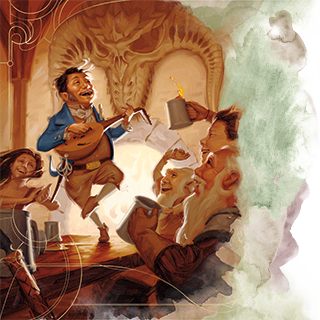
You are the embodiment of nature’s raw, untamed power. Having spent your life among the wilds, you have adapted to its challenges, mimicking the strengths of the most formidable creatures. Whether raised by beasts, trained by an ancient order of survivalists, or blessed by the land itself, you are a living legend of the wilderness.
- Skill Proficiencies:
- Perception
- Stealth
- Survival
- Nature
- Tool Proficiencies:
- Herbalism Kit
- Survival Tools (like traps and tracking tools)
- Languages: One of your choice (Sylvan, Druidic if DM allows, or another primal language).
- Equipment:
- A hunting knife (dagger)
- A cloak made from the hide of a beast you hunted
- A satchel of rare herbs (usable as a healing component)
- A totem or charm that connects you to the wild
- 10 gp
Feature: Predator’s Instinct
Your senses are as sharp as the creatures you hunt. You can read the natural world effortlessly, allowing you to:
- Track prey (or enemies) with unnatural precision—you gain advantage on Survival checks to track creatures in natural environments.
- Blend into the wild—while in forests, jungles, or similar terrain, you gain advantage on Stealth checks to remain unseen. When in any natural terrain, your footsteps make no sound, and you leave no tracks unless you choose to.
- Sense danger—you have a heightened ability to detect threats. You can’t be surprised while conscious in a natural setting.
- Keen Vision – You can clearly see details at a distance that most would miss. You suffer no penalties when making Perception checks at long range.
- Environmental Awareness – You can sense subtle shifts in your surroundings, such as changes in the wind, temperature, or the presence of creatures hiding nearby. You have advantage on Perception checks to notice hidden or camouflaged creatures within 30 feet.
Your time in the wild has granted you an instinctual bond with animals, allowing you to communicate with them in a primal way. While you cannot speak directly to them, animals recognize you as an ally and can convey information through body language, sounds, and subtle gestures.
- Animal Communication – You can attempt to interact with animals in a way they understand. You have advantage on Animal Handling checks when dealing with non-hostile beasts.
- Call of the Wild – Once per long rest, you can emit a sound or perform a specific gesture that draws the attention of nearby wildlife. The DM determines what animals (if any) respond, but friendly creatures may offer guidance, warn of danger, or even assist you.
- Wild Assistance – While tracking a creature in the wild, small animals (such as birds, wolves, or insects) might aid you by leaving clues, such as disturbed foliage, trails, or sounds that hint at the target’s location. If an animal is actively helping you, you gain a +2 bonus on Survival checks to track creatures.
- Natural Allies – If an animal you have bonded with is nearby, it may defend you in combat. At the DM’s discretion, a friendly beast can use its reaction to distract an enemy or impose disadvantage on an attack roll against you.









Comments